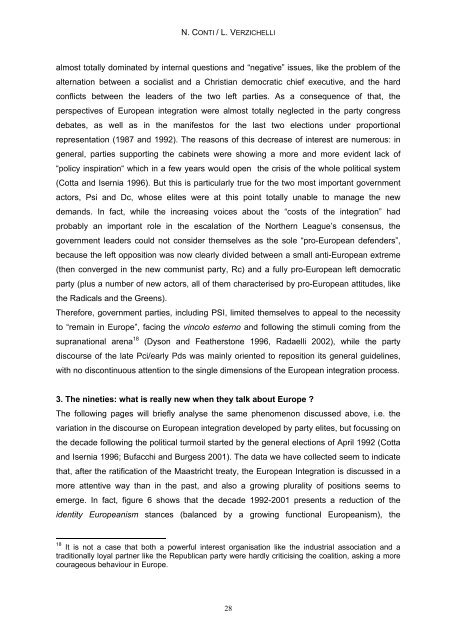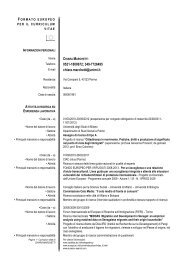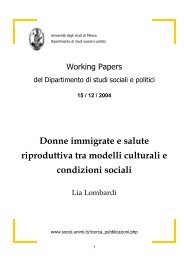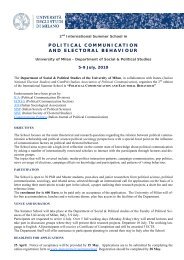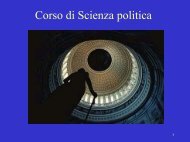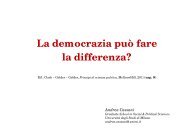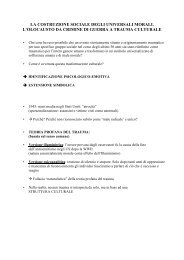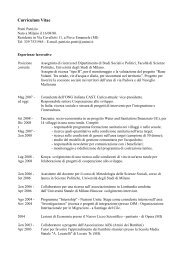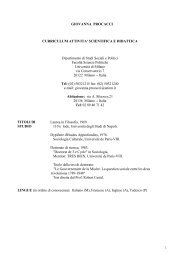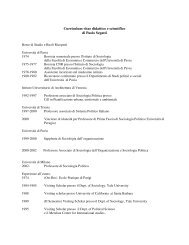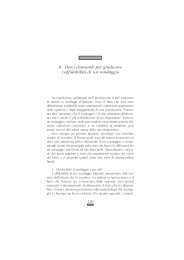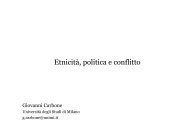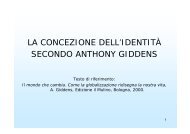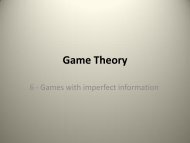The european dimension of political discourse in Italy. A ... - CIRCaP
The european dimension of political discourse in Italy. A ... - CIRCaP
The european dimension of political discourse in Italy. A ... - CIRCaP
Create successful ePaper yourself
Turn your PDF publications into a flip-book with our unique Google optimized e-Paper software.
N. CONTI / L. VERZICHELLI<br />
almost totally dom<strong>in</strong>ated by <strong>in</strong>ternal questions and “negative” issues, like the problem <strong>of</strong> the<br />
alternation between a socialist and a Christian democratic chief executive, and the hard<br />
conflicts between the leaders <strong>of</strong> the two left parties. As a consequence <strong>of</strong> that, the<br />
perspectives <strong>of</strong> European <strong>in</strong>tegration were almost totally neglected <strong>in</strong> the party congress<br />
debates, as well as <strong>in</strong> the manifestos for the last two elections under proportional<br />
representation (1987 and 1992). <strong>The</strong> reasons <strong>of</strong> this decrease <strong>of</strong> <strong>in</strong>terest are numerous: <strong>in</strong><br />
general, parties support<strong>in</strong>g the cab<strong>in</strong>ets were show<strong>in</strong>g a more and more evident lack <strong>of</strong><br />
“policy <strong>in</strong>spiration“ which <strong>in</strong> a few years would open the crisis <strong>of</strong> the whole <strong>political</strong> system<br />
(Cotta and Isernia 1996). But this is particularly true for the two most important government<br />
actors, Psi and Dc, whose elites were at this po<strong>in</strong>t totally unable to manage the new<br />
demands. In fact, while the <strong>in</strong>creas<strong>in</strong>g voices about the “costs <strong>of</strong> the <strong>in</strong>tegration” had<br />
probably an important role <strong>in</strong> the escalation <strong>of</strong> the Northern League’s consensus, the<br />
government leaders could not consider themselves as the sole “pro-European defenders”,<br />
because the left opposition was now clearly divided between a small anti-European extreme<br />
(then converged <strong>in</strong> the new communist party, Rc) and a fully pro-European left democratic<br />
party (plus a number <strong>of</strong> new actors, all <strong>of</strong> them characterised by pro-European attitudes, like<br />
the Radicals and the Greens).<br />
<strong>The</strong>refore, government parties, <strong>in</strong>clud<strong>in</strong>g PSI, limited themselves to appeal to the necessity<br />
to “rema<strong>in</strong> <strong>in</strong> Europe”, fac<strong>in</strong>g the v<strong>in</strong>colo esterno and follow<strong>in</strong>g the stimuli com<strong>in</strong>g from the<br />
supranational arena 18 (Dyson and Featherstone 1996, Radaelli 2002), while the party<br />
<strong>discourse</strong> <strong>of</strong> the late Pci/early Pds was ma<strong>in</strong>ly oriented to reposition its general guidel<strong>in</strong>es,<br />
with no discont<strong>in</strong>uous attention to the s<strong>in</strong>gle <strong>dimension</strong>s <strong>of</strong> the European <strong>in</strong>tegration process.<br />
3. <strong>The</strong> n<strong>in</strong>eties: what is really new when they talk about Europe ?<br />
<strong>The</strong> follow<strong>in</strong>g pages will briefly analyse the same phenomenon discussed above, i.e. the<br />
variation <strong>in</strong> the <strong>discourse</strong> on European <strong>in</strong>tegration developed by party elites, but focuss<strong>in</strong>g on<br />
the decade follow<strong>in</strong>g the <strong>political</strong> turmoil started by the general elections <strong>of</strong> April 1992 (Cotta<br />
and Isernia 1996; Bufacchi and Burgess 2001). <strong>The</strong> data we have collected seem to <strong>in</strong>dicate<br />
that, after the ratification <strong>of</strong> the Maastricht treaty, the European Integration is discussed <strong>in</strong> a<br />
more attentive way than <strong>in</strong> the past, and also a grow<strong>in</strong>g plurality <strong>of</strong> positions seems to<br />
emerge. In fact, figure 6 shows that the decade 1992-2001 presents a reduction <strong>of</strong> the<br />
identity Europeanism stances (balanced by a grow<strong>in</strong>g functional Europeanism), the<br />
18 It is not a case that both a powerful <strong>in</strong>terest organisation like the <strong>in</strong>dustrial association and a<br />
traditionally loyal partner like the Republican party were hardly criticis<strong>in</strong>g the coalition, ask<strong>in</strong>g a more<br />
courageous behaviour <strong>in</strong> Europe.<br />
28


